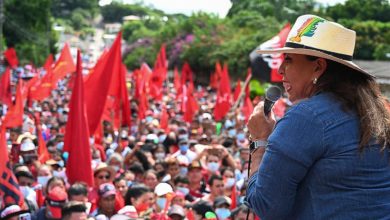Ukraine Shows the Strength of a Free People

TRussian aggression in Ukraine was a direct confrontation between dictatorships and free people. Because they are free, the free are winning.
Both Russia and Ukraine emerged with generations of oppression from their pasts after the fall of the Soviet Union. Each country struggled with rebuilding themselves as independent countries, with democratic and market-based economies. Russia’s initial prospects for success might have been somewhat better: President Boris Yeltsin defeated efforts by leftist nationalists and then communists to seize power and return Russia to autocracy. Ukraine’s leadership in the 1990s lacked Yeltsin’s vision and determination.
The two countries’ trajectories crossed in the 2000s, however. Yeltsin handed Russia to Vladimir Putin. Putin quickly consolidated power and soon became dictatorial. Ukraine’s politics, on the other hand got messier. In 2004, the Orange Revolution demonstrated that Ukraine wanted to hold honest elections. Oligarchs grew political and economic power and tried to control the state. While corruption flourished as in Russia in Ukraine, Putin centralized corruption while Ukrainian corruption was distributed among competing oligarchs. Putin’s centralization made governing Russia easy; Ukraine’s decentralization made governing Ukraine hard.
Then the 2014 EuroMaidan Revolution in Ukraine overthrew a Russia-friendly autocratically-minded leader and brought to power a pro-Western and pro-democracy president. Although Ukraine was still difficult to govern due to decentralization, corruption continued to exist at lower levels, despite constant efforts to eradicate it. However, the new leadership promised a more open path for Ukraine, with the goal of joining NATO and the European Union.
Ukrainians were energized by the Russian invasion of Donbas and seizure Crimea in 2014. It drove a burst of Ukrainian patriotism that had been slowly awakening since the country’s independence. The order it brought to the economy and government of Ukraine was not what they needed. It didn’t lead to centralization. However, it did not stop corruption. It did however fuel a surge in Ukrainian civil society activities as Ukrainians joined forces to resist the Russian invasion. The weaknesses and flaws in Ukraine’s government and economy in the face of Russian aggression forced its people to make themselves strong and resilient.
Russians were able to experience the reverse. The Yeltsin-era market reforms and economic boom of the 2000s driven by high oil prices allowed them to build a more prosperous society than they had ever known—prosperous enough for the elites that they mostly did not object loudly as Putin eroded their freedoms and centralized control in his own hands. Russia was experiencing more corruption than ever before. However, it was mostly centralized corruption. Putin made it appear orderly, making sure that those who he trusted reap the rewards. While a few brave Russians continued to work post-Soviet to create civil society organizations and other activities, most Russians didn’t feel the need to support or join them. Putin started to harass them over time. Power, money, and favor flowed from Putin, and no external threat or worry drove Russians to feel the need to organize themselves—especially when doing so was likely to cost power, money, favor, and possibly more.
Read More: Inside Volodymyr Zelensky’s World
When 2022 began, it was clear that the Russian military, commanded by a powerful ruler, was in charge of Ukraine’s state. The people in Ukraine faced a smaller, more chaotic, confusing, disorganized, and decentralized state. The outcome seemed obvious—Russia would crush Ukraine underfoot and Putin would impose his will on a people who never stood a chance.
However, the war was not a win-win situation. Russia’s military proved to be a Potemkin force. The systemic corruption and lying to civilian and military leadership that is the normal state of affairs in kleptocratic autocracies had hollowed out Russia’s armed forces. Equipment essential to the war effort had been sold, stolen or just never delivered. Russian soldiers had learned how to look good to their superiors in exercises that didn’t prepare them to fight. Putin’s dictatorship had restored and reaffirmed the Soviet traditions of never taking initiative, always waiting for orders, doing as little as possible to satisfy the bosses, and not owning responsibilities. Russian troops and commanders were forced to freeze when faced with staunch Ukrainian defenders, logistical, and other unanticipated problems.
Ukraine proved that even the most chaotic people could be strong. Ukrainians, seeing Russian armored columns coming at them, didn’t freeze. They didn’t call back to Kyiv for orders. They didn’t wait to be told what to do. They did what they were told. They did not fight back but also reached out via their personal networks of human beings, built up over many years of work to create civil society. They shared what they had seen, how they were working, and what they wanted. They worked out the best way to obtain essential equipment and supplies, as well as how to resolve problems. It was messy, confusing, and inefficient—but successful. It was difficult to manage Ukraine in relative peace, making it very hard for the war effort to end.
Many other factors went into Russia’s shocking failures and Ukraine’s amazing successes, of course. It is important not to take for granted Ukraine’s incredible heroism, willingness to sacrifice everything for the country and their perseverance through extraordinary hardships. This is not a trait that all freedom-loving people possess.
Ukraine is not a flawless society that has disappeared overnight. It will be difficult to manage a Ukraine after it has gained its independence. It will still be free.
The future holds no such promise for Putin’s Russia. Although Russians might be rallying in support of the flag at polls, they aren’t coming together as citizens for Russia to win this war. Putin allowed the aggression to continue, but Russian civil society is largely united in opposing it. Putin responded to the aggression by trying to destroy it completely. Russia will be sinking deeper into the darkness of dictatorial rule if Ukraine comes out with its civil society and freedoms intact. Ukrainians are discovering that working together in solving problems for the greater good is a way to succeed. Russians see that evil dictatorships can do more harm than good and that citizens should not be forced to work together.
The self-loathing that has become an American and European specialty over the past decades has eroded our own people’s belief that freedom is good and valuable. It had led some to wonder if the Chinese model wasn’t better than the Western one.
At the very least, this war ought to put that thought to rest.
Freedom can be messy. It’s flawed and always exposed. Our society’s inequalities are both real and significant. Our differences with one another can be profound and strong. Because we discuss it every day, all of this is well-known. Our society is flawed and we try to convince each other to correct them. Sometimes we get angry with our leaders, and then try to fix them ourselves. We complain, quite rightly, about these issues, making us unhappy about society and ourselves. These problems can cause us to feel less secure than those in countries with more polished faces.
However, the smooth facades that autocracies show conceal greater injustices and flaws. Putin found out that dictatorial systems can hide these weaknesses from even their own rulers. China is much stronger than Putin’s Russia. But even Xi Jinping would be wise to wonder what his people are hiding from him and to worry if he can find out before it’s too late.
Our weaknesses and faults are well-known, much like those of the Ukrainians. While we witness a free nation humiliate an apparently far greater dictatorship’s military, it is important to remember our main source of strength. It isn’t our wealth or size nor our armed might. Our ability to work in teams to resolve problems and not wait to be told what we should do is it. We must accept our freedom.
Here are more must-read stories from TIME





